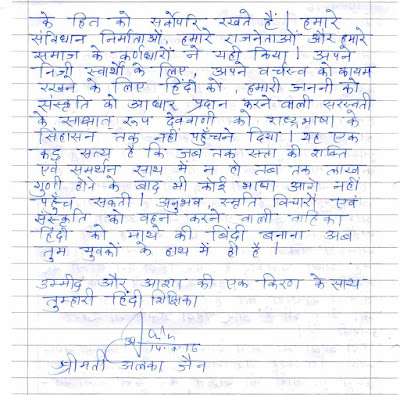Bliss Perry
(Bliss was in Indore for six weeks, with seven other American students, under the NSLI-Y programme, to study Hindi. He was hosted by Ishaan Nyati, Class X G.)
I’ll begin with a bang, by saying that my days in India have been among the most eventful and interesting in my life!
The simple reason: India and its lifestyle are about as far removed from America and its culture as possible, both physically and metaphorically speaking—there’s a reason one has to fly 15+ hours from New York to experience such a change. As one who has traveled somewhat frequently around Europe and Latin America, I
have visited several countries heavily characterized or influenced by Western and North-Atlantic culture. India, however, has been a completely new experience for me, ever since I landed in the Delhi airport. The physical landscape, the food, the architecture, and every last cultural detail, even the way people communicate simple information, are totally novel. Simply put, I have had to carry a little notepad with me everywhere I go just to keep track of all I am absorbing with each and every one of my senses. India is a place where even the most commonplace five minute car rides are interesting opportunities to learn something more about the way life works here.
The place is a wonderful sensory and cultural overload. This dynamic atmosphere pervades throughout this country of over one billion people. Unlike some of Southern Europe’s famously slow lifestyles, something is always happening here: loud mobs of people crossing the street, or a honking swarm of cars, auto-rickshaws, and motorcycles clogging the road, for example. Every morning I stroll out of my house to the scent of spices mixed with smoke, to the milkman’s cries of “Dudh, dudh!” (Milk, milk), to the sights of brightly painted buildings and flashing signs with a mixture of Hindi and English text. While, in Europe, historical sights are generally designated their own areas and separated from everything else, India is so rooted in history and tradition that century-old temples stand right next to modern office-buildings as if someone had created the city-streets as part of a Sims game. The land is so sacred and rooted in religion that people do not set off a designated time of the week to worship but rather breathe their faiths every minute of the day through lifestyle choices like

vegetarianism and ritual greetings like “Jai Shri Ram!” (“Hail Lord Ram,” preferred in my host household). Lastly, India is a heavily diverse land and, while many Western nations (America included) are struggling with such a concept, here, Hindus, Muslims, Sikhs, Jains, and even more groups live side by side, speaking over 400 different languages more unrelated to each other than even English is to Hindi.
A few words about Indian schools in general since they are quite different from American ones. The underlying difference is that, here, education is viewed as sacred. This notion dictates many aspects of the Indian educational system. Teachers are rarely questioned and are treated with utmost respect (even more so than parents) because they are viewed as the messengers of such sacred knowledge. With an application system, stressing examinations much more than America’s holistic system and sheer masses of qualified applicants—you’ll find that India’s academic climate is one of the most competitive of the world. Oftentimes, in order to be accepted into a top university, applicants need to score above 99.6% on their examinations. Therefore, students here are much more studious than their American counterparts, and concepts like procrastination and “winging” homework assignments do not really exist here.

My school, the Shishukunj International School, and the Indian system of education never cease to wow me. Along with the other 7 NSLI-Y students, I attend special Hindi classes here. We’ve already learned quite a bit of Hindi for only two weeks. As Hindi is an Indo-European language related to English, Latin, Greek, and all the others I have studied, it has been quite interesting for me to observe all of the linguistic connections, especially the lexical (tooth: daant, compare with Latin dens, dentis and Greek odous, odontos and English words like dental).
It’s also different enough, however, from English that it has posed an engaging challenge to learn—even the pronunciation, with many aspirated/unaspirated distinctions, retroflex consonants, and nasalized vowels non-existent in English.
Outside of school, my host family has gratefully been committed to showing me as much of Indore as possible. Together, my host family, my classmates, and I have explored its famous palaces, bazaars, and temples—as well as experiencing more modern experiences such as attending birthday parties at the shiny glass malls, swimming at the pool of the renowned Yeshwant Club, and watching Bollywood’s newest hit, Sultan, at the movie theater. Walking around the streets has been, like everything else at this point, a new experience: the streets are utterly jammed with an irregularly moving current of people, cart-vendors, bikes, motorcycles, auto-rickshaws, and cars—not to mention, the cows and herds of goats and sheep, who are the true dictators of traffic.
My classmates and I draw stares from all directions, as Indore does not draw many foreigners. It’s always positive attention, however, and the locals have been quite interested to show us their culture as well as learn about ours—in essence, the goal of the NSLI-Y program.
 One particular experience that I have quite enjoyed has been the Indian wedding, of which, to this point, I have attended six. They offer a colorful atmosphere in which tradition prevails: from the interesting rituals of the procession to the Sanskrit chants in the wedding structure. Every event that I have attended has been luxurious beyond belief—decked with celebrity singers and mile-long buffets containing all cuisines from South-Indian to Mexican. One of them was even held in a palace-like structure, with others in fancy hotels, conference centers, and exquisite tents.
One particular experience that I have quite enjoyed has been the Indian wedding, of which, to this point, I have attended six. They offer a colorful atmosphere in which tradition prevails: from the interesting rituals of the procession to the Sanskrit chants in the wedding structure. Every event that I have attended has been luxurious beyond belief—decked with celebrity singers and mile-long buffets containing all cuisines from South-Indian to Mexican. One of them was even held in a palace-like structure, with others in fancy hotels, conference centers, and exquisite tents.Speaking of food, I would like to now elaborate on that which I think has been another important part of my experience. When I was notified before departure that my family would be vegetarian, I—a self- professed “carnivore” and slim eater of vegetables—couldn’t help but be slightly concerned. However, all of such worries have since been alleviated. The vegetables and meat substitutes such as paneer (a type of cheese) here are so fresh, well-prepared and spicy that, in essence, they taste like meat.

Additionally, all the necessary protein and more is provided in lentil dishes like the ubiquitous daal. I’ve gobbled down every last morsel presented on my plate, and have had almost no trouble adjusting to the spiciness of the food. Also, I have quite enjoyed the usage of bread, whether roti, naan, or paratha, as a utensil—it soaks up the flavor of the other dishes quite well. On another note, I have become quite more aware of regional differences within Indian cuisine, from local specialties like poha and jalebi to South Indian dishes like dosa. Lastly, I have experienced the Indian embodiment of other world cuisines, such as Chinese and Italian—just as we Americans have adapted other cultures’ foods to our tastes, so have the Indians.
My first two weeks in India have been so wonderful and I am already learning so much about a part of the world previously unknown to me. More importantly, I feel that I have already forged relationships and lifetime connections with my host family. It has been a delight to have meshed into the complex household atmosphere. I feel so grateful to my host family, my host school, and the United States government for providing me with such a fundamentally life-changing opportunity.
To read about Bliss’ experiences in more detail please visit
and

















